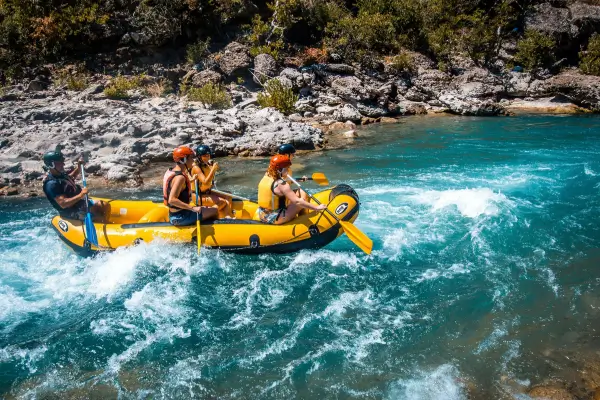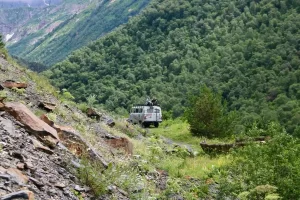Eco-tourism has experienced a surge in popularity over recent years as more travelers seek to immerse themselves in nature while minimizing their environmental footprint. Gone are the days when vacations meant lounging on beaches or staying in crowded resorts. Today, nature lovers are opting for adventures that allow them to explore breathtaking landscapes, from the rugged peaks of mountain ranges to the vibrant underwater world of coral reefs, all while contributing to the preservation of these precious ecosystems.
Sustainable travel is more than just a trend; it’s a necessary shift in how we approach our interactions with the planet. With growing awareness of the environmental impact of traditional tourism, eco-conscious travelers are looking for ways to engage with nature that promote conservation rather than exploitation. Eco-adventures focus on preserving natural landscapes, supporting local communities, and encouraging respect for wildlife and ecosystems.
These eco-friendly adventures don’t sacrifice excitement. In fact, they elevate it by combining the thrill of exploration with a sense of responsibility for the environment. Whether you’re scaling the heights of a towering mountain, trekking through dense rainforests, or diving into the crystal-clear waters of a coral reef, these experiences offer the perfect blend of adventure and environmental stewardship.
In this blog, we’ll take you on a journey “From Peaks to Reefs,” exploring some of the top eco-adventures for nature lovers. We’ll uncover thrilling activities that allow you to experience the planet’s most beautiful and fragile ecosystems, all while contributing to their preservation. Whether you’re drawn to towering mountains, lush forests, or vibrant coral reefs, there’s an eco-adventure waiting for you. Let’s dive in!
Mountain Adventures: Scaling the Heights
Mountains have long captivated adventurers with their majestic peaks and untamed beauty, offering a unique blend of physical challenge and spiritual fulfillment. For eco-conscious travelers, mountain adventures provide a thrilling way to connect with nature while preserving the delicate ecosystems of these towering landscapes. Whether hiking, climbing, or wildlife spotting, mountain eco-adventures offer unparalleled experiences for those who appreciate nature’s grandeur.
Hiking & Trekking
Hiking and trekking are some of the most popular and accessible eco-adventures, allowing travelers to immerse themselves in pristine natural landscapes while minimizing their environmental impact. Iconic eco-friendly trekking destinations such as Patagonia’s Torres del Paine, Nepal’s Annapurna Circuit, and the Appalachian Trail in the U.S. offer breathtaking views and the chance to experience diverse ecosystems.
These trails are often located in protected areas where conservation efforts are essential to maintaining the balance between human activity and nature. For instance, the Annapurna Conservation Area in Nepal focuses on protecting wildlife and promoting sustainable tourism by limiting the number of trekkers and encouraging responsible hiking practices. Similarly, Patagonia has implemented strict regulations to ensure that its unique flora and fauna remain undisturbed by visitors. Hikers are encouraged to stay on marked trails, carry out all waste, and practice Leave No Trace principles, ensuring the ecosystems they traverse remain untouched for future generations.
Mountaineering & Climbing
For those seeking even greater challenges, mountaineering and climbing offer a thrilling way to scale the world’s most iconic peaks while promoting sustainability. Eco-conscious climbers are drawn to mountains such as Kilimanjaro in Tanzania, the Alps in Europe, and Mount Rainier in the United States. These destinations not only offer stunning views but also emphasize the importance of preserving mountain ecosystems.
Sustainable mountaineering practices include minimizing waste, using eco-friendly gear, and respecting local wildlife and habitats. On Kilimanjaro, for example, climbers are encouraged to hire local guides and porters, which not only supports the local economy but also ensures that the trek is done responsibly. In the Alps, climbers are reminded to follow strict guidelines to avoid disturbing fragile alpine environments, such as avoiding certain areas during the breeding season of local wildlife.
Summiting these peaks is a powerful reminder of the fragility of our natural world, and climbers play a critical role in protecting these environments through their actions and advocacy.
Wildlife Spotting in the High Altitudes
Mountain regions are home to some of the world’s most elusive and fascinating wildlife, and eco-adventurers have the unique opportunity to spot species that thrive in these harsh environments. From the elusive snow leopard prowling the heights of the Himalayas to the Andean condor soaring above South American peaks, these animals are adapted to life in rugged terrains. Alpine birds, mountain goats, and rare plant species can also be spotted in high-altitude ecosystems.
Responsible wildlife watching in mountain regions involves respecting the habitats of these animals, maintaining a safe distance, and avoiding disruptive behavior that could stress or harm the wildlife. In areas like Ladakh in India, where snow leopard spotting has become a popular activity, eco-tourism initiatives have been established to promote ethical wildlife viewing. By employing local guides who understand the landscape and the habits of these animals, tourists can observe wildlife in a way that supports conservation efforts and protects the natural environment.
Mountain eco-adventures offer a perfect combination of physical challenge and deep connection with nature, providing experiences that leave both the adventurer and the environment enriched.
Forest Escapades: Immersing in the Green Lungs of Earth
Forests, often referred to as the “green lungs” of the planet, are vital for maintaining Earth’s biodiversity and regulating the global climate. For nature lovers, exploring forests offers a profound opportunity to experience the beauty and complexity of these ecosystems while promoting their conservation. From walking among the treetops to trekking through dense jungles, forest escapades provide eco-conscious travelers with thrilling adventures that foster a deep connection to nature.
Canopy Walks & Ziplining
One of the most exhilarating ways to experience the majesty of forests is through canopy walks and ziplining, which allow adventurers to explore the upper layers of rainforests without disturbing the fragile ecosystem below. Destinations like Costa Rica and Borneo offer some of the best eco-friendly canopy tours in the world. In Costa Rica, the Monteverde Cloud Forest Reserve is renowned for its suspended walkways that provide an immersive view of the forest canopy, offering glimpses of exotic birds, monkeys, and vibrant plant life. Similarly, in Borneo, canopy walks in the Danum Valley Conservation Area let visitors observe the rich biodiversity of one of the world’s oldest rainforests from above.
These canopy tours do more than just provide adventure; they also raise awareness about the importance of rainforest conservation. By allowing visitors to see the incredible diversity of species that thrive in the treetops, canopy tours foster a sense of responsibility toward protecting these delicate ecosystems. Additionally, many of these tours are designed to minimize environmental impact, with eco-friendly platforms and sustainable operations that prioritize the well-being of the forest.
Jungle Treks
For those who want a deeper dive into the heart of the forest, jungle treks offer an immersive way to explore the Earth’s most biodiverse regions. Iconic destinations for sustainable jungle exploration include the Amazon Rainforest in South America, the rainforests of Borneo, and the Congo Basin in Central Africa. These treks allow travelers to experience the full spectrum of rainforest life, from towering trees and lush undergrowth to the vibrant wildlife that calls these environments home.
The ecological importance of rainforests cannot be overstated. These ecosystems play a crucial role in absorbing carbon dioxide, regulating global temperatures, and housing countless species, many of which are not found anywhere else on Earth. Eco-tourism in these regions, when done responsibly, helps protect the rainforests by supporting conservation efforts and providing local communities with alternative, sustainable sources of income. However, it’s essential for travelers to choose operators that prioritize low-impact travel and contribute to local conservation initiatives.
Forest Wildlife Encounters
One of the greatest rewards of exploring forests is the opportunity to encounter the extraordinary wildlife that inhabits these rich ecosystems. From the gentle sloths of Central and South America to the powerful jaguars that roam the Amazon, forests are home to an astonishing variety of species. In Borneo, visitors can catch sight of the endangered orangutans, while the forests of Costa Rica teem with exotic birds like toucans and macaws. The Congo Basin offers the chance to spot lowland gorillas, forest elephants, and a variety of primate species.
Eco-conscious wildlife viewing is essential in these delicate environments. It’s important to observe animals from a respectful distance to avoid causing stress or disturbance. Travelers should also opt for guided tours led by local experts, as these guides are trained to minimize impact on wildlife while providing meaningful and educational experiences. In places like Borneo and the Amazon, responsible eco-tourism plays a crucial role in protecting endangered species by supporting conservation efforts and discouraging activities like illegal logging and poaching.
Forest escapades provide nature lovers with the chance to immerse themselves in some of the most important ecosystems on the planet, all while contributing to their preservation. By engaging in eco-friendly adventures like canopy tours, jungle treks, and responsible wildlife viewing, travelers can help ensure that these forests remain vibrant and thriving for generations to come.
Water-Based Eco-Adventures: From Rivers to Reefs
Water-based eco-adventures offer nature lovers the chance to experience some of the planet’s most beautiful and fragile ecosystems, from tranquil rivers to vibrant coral reefs. These adventures provide thrilling encounters with nature while fostering a deep sense of responsibility for the preservation of aquatic environments. Whether paddling through pristine waterways or exploring the underwater world, these experiences bring travelers closer to the heart of nature while supporting conservation efforts.
Kayaking & Canoeing
Kayaking and canoeing are perfect eco-adventures for travelers who want to explore the beauty of rivers, lakes, and fjords while leaving a minimal environmental footprint. Some of the most popular eco-friendly kayaking destinations include the stunning Norwegian fjords, where travelers can glide through serene waters surrounded by towering cliffs, and the Amazon River, which offers the chance to paddle through dense rainforests teeming with wildlife.
Minimizing environmental impact while kayaking or canoeing is relatively simple: paddlers should stick to designated routes, avoid disturbing wildlife, and refrain from littering. Eco-conscious travelers often opt for tours led by local guides who can educate them about the ecosystems they are exploring, while also supporting the livelihoods of local communities. Many kayaking destinations have implemented strict regulations to protect the water quality and surrounding habitats, making these adventures a low-impact way to experience nature’s beauty.
Scuba Diving & Snorkeling
Scuba diving and snorkeling offer unparalleled access to the underwater world, where vibrant coral reefs teem with marine life. For eco-conscious divers, top destinations like Australia’s Great Barrier Reef, the Belize Barrier Reef, and Palau provide breathtaking underwater adventures while emphasizing the importance of reef conservation.
Coral reefs are among the most biodiverse ecosystems on the planet, but they are also incredibly fragile. Eco-tourism plays a crucial role in reef conservation by raising awareness about the threats reefs face, such as climate change, pollution, and overfishing. Responsible diving practices, such as avoiding physical contact with the reef, using reef-safe sunscreen, and adhering to established diving guidelines, are essential for minimizing the impact on these delicate ecosystems. Many eco-conscious dive operators also support coral restoration projects and marine conservation initiatives, ensuring that travelers’ experiences directly contribute to the protection of these underwater wonders.
Rafting
For thrill-seekers, rafting down wild rivers is an exhilarating way to experience nature’s power while supporting eco-tourism initiatives that help preserve freshwater ecosystems. Popular eco-adventure spots for river rafting include the Colorado River, which carves its way through the iconic Grand Canyon, and the Zambezi River in Africa, renowned for its adrenaline-pumping rapids and dramatic scenery.
Clean rivers are essential for maintaining healthy ecosystems, and eco-tourism plays a significant role in their preservation. Many river rafting operators work closely with local conservation organizations to promote sustainable practices, such as limiting the number of rafters on the water, reducing waste, and protecting surrounding wildlife habitats. Additionally, eco-tourism in these regions often supports efforts to combat pollution, overfishing, and dam construction, all of which threaten river ecosystems.
Water-based eco-adventures offer a unique way to explore some of the world’s most beautiful and biodiverse environments. Whether kayaking through majestic fjords, diving into vibrant coral reefs, or rafting down powerful rivers, these adventures provide nature lovers with unforgettable experiences while promoting the protection and conservation of aquatic ecosystems.
Desert Adventures: Sustainable Thrills in Arid Lands
Deserts, with their sweeping dunes, dramatic landscapes, and unique wildlife, offer eco-conscious travelers a chance to explore some of the most fascinating and fragile ecosystems on the planet. From sandboarding on towering dunes to experiencing the rich culture of nomadic communities, desert adventures provide a sustainable way to enjoy these arid landscapes while contributing to their conservation.
Sandboarding & Dune Trekking
Sandboarding and dune trekking are thrilling ways to explore deserts while maintaining a low environmental impact. Popular eco-conscious destinations include the vast Sahara Desert in Africa and the otherworldly Namib Desert in Namibia, where adventurers can slide down massive dunes or trek across windswept sands.
Desert ecosystems are fragile, and travelers must take care to avoid disturbing the delicate balance of flora and fauna that survive in these harsh environments. It’s important to stay on marked paths to prevent soil erosion and avoid disrupting wildlife habitats. Eco-conscious tour operators in these regions focus on minimizing human impact by limiting the number of visitors and promoting education about the importance of desert conservation.
Camel Safaris & Nomadic Experiences
Camel safaris offer a traditional, sustainable way to explore deserts, providing a slower-paced adventure that allows travelers to fully appreciate the vast beauty of arid landscapes. In regions like the Sahara or the Thar Desert in India, guided camel safaris led by local nomadic communities offer an authentic and eco-friendly desert experience.
These tours not only minimize environmental impact but also provide an opportunity to learn about the unique desert ecosystems and the wildlife that thrives there, such as desert foxes, reptiles, and rare plant species. By traveling with local guides, adventurers support the cultural heritage of nomadic peoples while gaining a deeper understanding of how these communities coexist sustainably with their environment.
Ocean Conservation and Beach Eco-Activities
Our oceans and beaches are facing unprecedented threats from pollution, overfishing, and climate change, but eco-conscious travelers can play a vital role in their preservation. Whether through hands-on conservation efforts or sustainable water sports, these beach activities offer nature lovers the chance to combine adventure with meaningful environmental impact.
Beach Cleanups
For travelers seeking a rewarding way to give back to the environment, beach cleanups provide the perfect opportunity to combine travel with volunteering. Popular destinations like Hawaii and Thailand offer organized beach cleanups that allow visitors to contribute to the preservation of beautiful coastlines.
By participating in beach cleanups, travelers help remove plastic waste, debris, and other pollutants that threaten marine life and ecosystems. These efforts not only improve the immediate environment but also raise awareness about the global issue of ocean pollution, encouraging more sustainable behavior among both tourists and locals.
Sustainable Surfing
Surfing, a sport that relies entirely on the ocean, has become a powerful force for marine conservation. Eco-conscious surfing destinations like Bali, Hawaii, and Costa Rica attract surfers who are passionate about preserving the ocean they enjoy. Sustainable surfing practices, such as using eco-friendly surfboards, minimizing plastic waste, and supporting local conservation efforts, are becoming more common in these destinations.
Many surf communities are actively involved in ocean conservation initiatives, from organizing beach cleanups to raising awareness about the impact of climate change on coastal areas. Sustainable surfers often champion causes such as protecting coral reefs, reducing plastic waste, and conserving marine life, making their sport not only a thrilling adventure but also a platform for environmental activism.
Sea Turtle Conservation Programs
For those seeking a deeper connection to marine life, participating in sea turtle conservation programs is an unforgettable experience. Destinations like Mexico, Costa Rica, and Australia offer hands-on eco-programs where travelers can actively engage in the protection of endangered sea turtles. These programs often involve helping with hatchling releases, monitoring nests, and educating the public about the importance of protecting sea turtles and their habitats.
Sea turtles face numerous threats, including habitat loss, pollution, and illegal poaching, making conservation efforts critical to their survival. By joining these programs, travelers contribute directly to the preservation of these majestic creatures, ensuring future generations can witness the awe-inspiring sight of sea turtles nesting and hatching on protected beaches.
Responsible Travel Tips for Eco-Adventurers
Engaging in eco-adventures is about more than just exploring nature—it’s about doing so responsibly, ensuring that your actions help protect and sustain the environments you visit. Here are some key tips to help you travel responsibly and make a positive impact during your adventures.
Choosing Eco-Certified Guides and Tours
One of the best ways to ensure that your travel experience is sustainable is by selecting eco-certified guides and tours. Look for operators with recognized certifications, such as those from the Global Sustainable Tourism Council (GSTC) or Green Globe. These certifications indicate that the company prioritizes environmental conservation, supports local communities, and practices sustainable tourism. By choosing certified operators, you’re directly contributing to responsible tourism efforts and supporting businesses that are dedicated to preserving the ecosystems they operate in.
Packing Sustainably (Eco-Friendly Gear and Essentials)
When preparing for an eco-adventure, what you pack matters. Opt for eco-friendly gear made from sustainable materials, such as reusable water bottles, biodegradable toiletries, and clothing made from organic or recycled fabrics. Avoid single-use plastics, and bring items like reusable shopping bags, utensils, and containers. Minimizing your waste not only reduces your environmental footprint but also sets an example for other travelers and locals alike.
Leave No Trace Principles
The Leave No Trace principles are essential for any eco-adventurer. These seven guidelines encourage outdoor enthusiasts to minimize their impact on natural environments. They include:
- Plan ahead and prepare: Research the environment you’re visiting and pack appropriately.
- Travel and camp on durable surfaces: Stick to established trails and campsites to avoid damaging delicate ecosystems.
- Dispose of waste properly: Pack out all trash, and make sure to properly dispose of human waste.
- Leave what you find: Avoid taking natural souvenirs, and leave flora, fauna, and historical artifacts undisturbed.
- Minimize campfire impact: Use portable stoves instead of open fires, and only use fire rings when absolutely necessary.
- Respect wildlife: Observe animals from a distance and never feed or disturb them.
- Be considerate of other visitors: Keep noise to a minimum and respect the solitude and experience of others.
Supporting Local Communities During Your Travels
Eco-tourism isn’t just about protecting the environment; it’s also about supporting the communities that live in and around these natural spaces. Choose locally owned accommodations, guides, and restaurants whenever possible. Not only does this boost the local economy, but it also fosters a deeper connection to the culture and traditions of the region. Purchasing handmade goods or supporting local businesses provides a more authentic travel experience while ensuring that your money contributes directly to the well-being of the community.
Conclusion
From the towering peaks of the world’s most iconic mountain ranges to the vibrant depths of coral reefs, eco-adventures offer unparalleled opportunities to explore and appreciate nature while actively contributing to its conservation. We’ve journeyed through deserts, forests, rivers, and oceans, discovering thrilling yet sustainable ways to engage with the planet’s most fragile ecosystems.
As eco-tourism continues to grow, it offers hope for the future of travel—one where adventure and environmental stewardship go hand in hand. By embracing responsible travel practices, such as supporting local communities, packing sustainably, and choosing eco-friendly tours, you can embark on your own eco-adventure with confidence, knowing that your actions are making a positive difference.
The future of eco-tourism holds great promise. As more travelers adopt sustainable practices, we can help protect the natural landscapes we cherish while ensuring they remain vibrant and accessible for future generations. So, whether you’re sandboarding in the Sahara, kayaking through fjords, or hiking forest trails, let your adventures be a force for good—for nature, for wildlife, and for the world.




